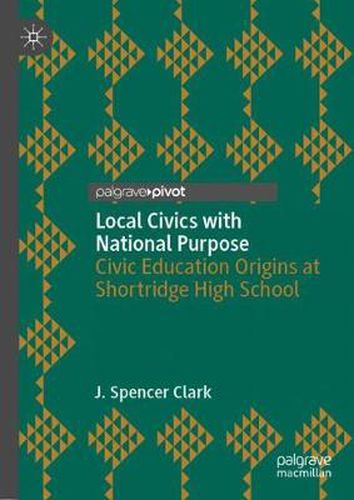Readings Newsletter
Become a Readings Member to make your shopping experience even easier.
Sign in or sign up for free!
You’re not far away from qualifying for FREE standard shipping within Australia
You’ve qualified for FREE standard shipping within Australia
The cart is loading…






This title is printed to order. This book may have been self-published. If so, we cannot guarantee the quality of the content. In the main most books will have gone through the editing process however some may not. We therefore suggest that you be aware of this before ordering this book. If in doubt check either the author or publisher’s details as we are unable to accept any returns unless they are faulty. Please contact us if you have any questions.
This book examines the development of civic education in the United States through the lives of two teachers at Shortridge High School (SHS) in Indianapolis around 1900. After situating civic education at the turn-of-the-century, the book describes the career of Laura Donnan-her influences, teaching, extracurriculars, and civic life-through the lens of her unique epistemology, shaped by negotiating the gendered ideologies of her era. Then, the book re-examines Arthur W. Dunn’s career, focusing on his ten years at SHS, and the influence of Donnan on his popular community civics curriculum and subsequently the 1916 report The Social Studies in Secondary Education. Previous scholars have overlooked Dunn’s time at SHS, viewing it simply as a stepping stone for the progressive educator’s career. This book argues that Dunn’s time at SHS was pivotal to his career due to influential colleagues, primarily Donnan. To conclude, Clark discusses the implications of Donnan’s epistemology in shaping civic education in the United States.
$9.00 standard shipping within Australia
FREE standard shipping within Australia for orders over $100.00
Express & International shipping calculated at checkout
This title is printed to order. This book may have been self-published. If so, we cannot guarantee the quality of the content. In the main most books will have gone through the editing process however some may not. We therefore suggest that you be aware of this before ordering this book. If in doubt check either the author or publisher’s details as we are unable to accept any returns unless they are faulty. Please contact us if you have any questions.
This book examines the development of civic education in the United States through the lives of two teachers at Shortridge High School (SHS) in Indianapolis around 1900. After situating civic education at the turn-of-the-century, the book describes the career of Laura Donnan-her influences, teaching, extracurriculars, and civic life-through the lens of her unique epistemology, shaped by negotiating the gendered ideologies of her era. Then, the book re-examines Arthur W. Dunn’s career, focusing on his ten years at SHS, and the influence of Donnan on his popular community civics curriculum and subsequently the 1916 report The Social Studies in Secondary Education. Previous scholars have overlooked Dunn’s time at SHS, viewing it simply as a stepping stone for the progressive educator’s career. This book argues that Dunn’s time at SHS was pivotal to his career due to influential colleagues, primarily Donnan. To conclude, Clark discusses the implications of Donnan’s epistemology in shaping civic education in the United States.